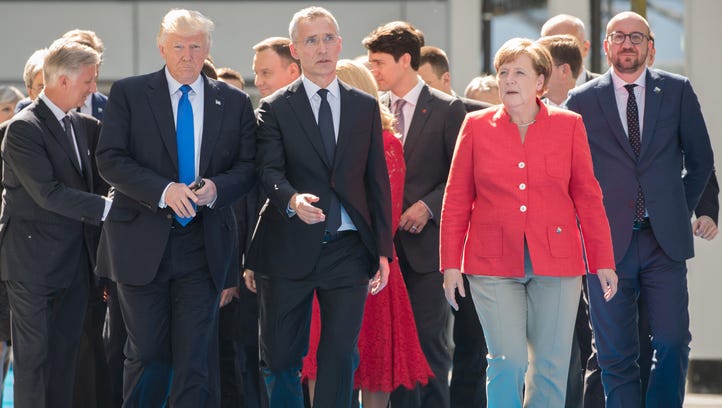
The American president is a politician who doesn’t try to persuade anyone. If there exists in his view of the world any personality whom it makes sense to persuade, that person is he himself. And as long as he persuades himself of anything, he regards it as an axiom, which it is not then necessary to prove, give reasons for or even discuss. That was how his speech at Thursday’s NATO summit in Brussels sounded.
Donald Trump’s imprint is business, and he has no affiliation with alliance obligations, including NATO. To the extent that NATO interests him, it’s only in the transactional sense of quid pro quo. That’s an important perspective in a situation where, out of 28 alliance members, only five states (the U.S., Greece, Estonia, Britain and Poland) spend the pledged 2 percent of gross domestic product on defense. Only Trump declares it with an arrogance that slams all the others. How many media outlets have analyzed the issue that every member must, by December, draw up a national plan to raise defense expenditures to 2 percent of the GDP? But the clip of Trump arrogantly shoving aside Montenegro Prime Minister Markovic has circled the entire globe.
Trump chides European members of NATO like unruly schoolchildren. But that’s not necessarily an insurmountable problem. Europe deserves to be chided over defense spending. A more fundamental snag is that Trump offers no counterweight to his arrogance, let alone a guarantee. In his speech he failed to pronounce the words, key for Europe, that the U.S. will fulfill its obligation under Article 5 of the North Atlantic Treaty – that an attack on one member is considered an attack on all of NATO. So it comes as no surprise that instead of a reflection on its own inadequacy, there is a growing feeling in Europe of defiance. Spiegel Online describes it thus: “Trump remains Trump, and the political class of the old continent will have to accept with a certain horror that the new man in the White House feels more comfortable in Saudi Arabia than with his old European allies.”

Leave a Reply
You must be logged in to post a comment.